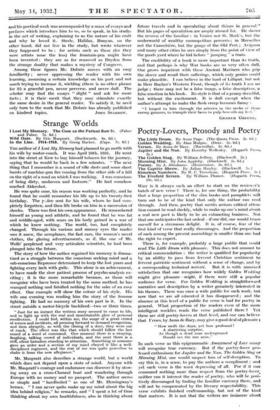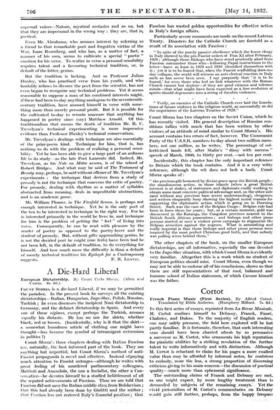Poetry-Lovers, Prosody and Poetry
10s. ad.)
Wm- is it always such an effort. to start on the reviewer's batch of new verse ? There is, for one thing, the probability that a large proportion of the slim books and pamphlets will turn out to be of the kind that only the author can read through. And then, poetry that merits serious critical atten- tion cannot be read slackly, while to make up one's mind about a real new poet is likely to be an exhausting business. Not that one anticipates the last ordeal—if one did, one would brace oneself for a strenuous delight. It is, of course, fear of the first kind of verse that really discourages. And the proportion of such among the present assemblage is smaller than one had the right to expect.
There is, for example, probably a large public that could read The Little Drum with pleasure. This does not amount to critical commendation : the writer is qualified for popularity by an ability to pass from fervent Christian sentiment to fervent patriotic sentiment without a sense of change, and by a corresponding technical naivete. But it is. with unmixed satisfaction that one recognizes how widely Golden Wedding might give pleasure—might, if there were still a popular audience for verse. For Golden Wedding is straightforward narrative and description by a writer genuinely interested in his themes. There was once a wide public for such work, but now that we are all educated it has disappeared ; and the absence at this level of a public for verse is bad for poetry in general. What proportion of the readers even of the more intelligent weeklies reads the verse published there ? Yet there are still poetry-lovers at that level, and one can believe that Verses, by Anna de Bary, may give a good deal of pleasure a
How swift the days, yet how profound ! A shattering surprise, As though a dead man underground Should see the sun arise."
In such verse as this epigrammatic Amazement of Love nsany will recognize true currency. But if the poetry-lover pro- fessed enthusiasm for Jupiter and the Nun, The Golden Stag or Morning Mist, one would suspect him of self-deception. To say this is, in a sense, to pay the authors a compliment ; and yet such verse is the most depressing of all. For if it can command nothing more than respect from the poetry-lover, neither can it interest the reader of poetry, who will be posi- tively discouraged by finding the familiar currency there, and will not be compensated by the literary respectability. This verse exhibits finished craftsmanship, but not of the kind that matters. It is not that the writers are insincere about
supernal voices—Nature, mystical ecstasies and so on, but that they are impersonal in the wrong way : they are, that is, poet ical.
Even Mr. Abrahams, who arouses interest by referring as a friend to that remarkable poet and forgotten victim of the ll'ar, Isaac Rosenberg, and who has, as a matter of fact, a manner of his own, seems to cultivate a special " poetic " emotion for his verse. To realize in verse a personal sensibility requires talent and a favouring technical tradition, or, in default of the latter, genius.
But the tradition is lacking. And so Professor Julian Huxley, who has practised verse from his youth, and who laudably refuses to divorce the poet from the scientist, has not even begun to recognize any technical problems. Yet it seems reasonable to suppose a man of his combined interests might, if there had been to-day anything analogous to the seventeenth- century tradition, have amused himself in verse with some- thing more than merely personal profit. But it is possible for the cultivated to-day to remain unaware that anything has happened in poetry since (say) Matthew Arnold. Of this traditionalism that means the death of tradition Mr. R. C. Trevelyan's technical- experimenting is more impressive evidence than Professor Huxley's technical conservatism.
Trevelyan's dealings with technique are also essentially of the prize-poem kind. Technique for him, that is, has nothing to do with the problem of realizing a personal sensi- bility. Yet he has been able to give a large part of an arduous life to its study—as the late Poet Laureate did. Indeed, Mr. Trevelyan, as his Note on Metre avows, is of the school of Robert Bridges. And what may be said of The Testament of Beauty may, perhaps, be said without offence of Mr. Trevelyan's experiments : the technique that derives from a study of prosody is not the technique that concerns the critic of poetry. For prosody, dealing with rhythm as a matter of syllables abstracted from meaning, deals in unprofitable abstractions, and is an academic game.
Mr. William Plomer, in The Fivefold Screen, is perhaps not enough interested in technique. Yet he is the only poet of She ten to be interested in tecimique in the right way. For be is interested primarily in the world he lives in, and technique for him is the problem of getting the " feel" of living into verse. Consequently, he can be read with pleasure by the reader of poetry as opposed to the poetry-lover and the student of prosody. But, without gifts approaching genius, he is not the decided poet he might (one feels) have been had he not been left, in the default of tradition, to do everything for himself. And how much more the dilliculty is than a default of merely technical tradition his Epitaph for a contemporary





































 Previous page
Previous page